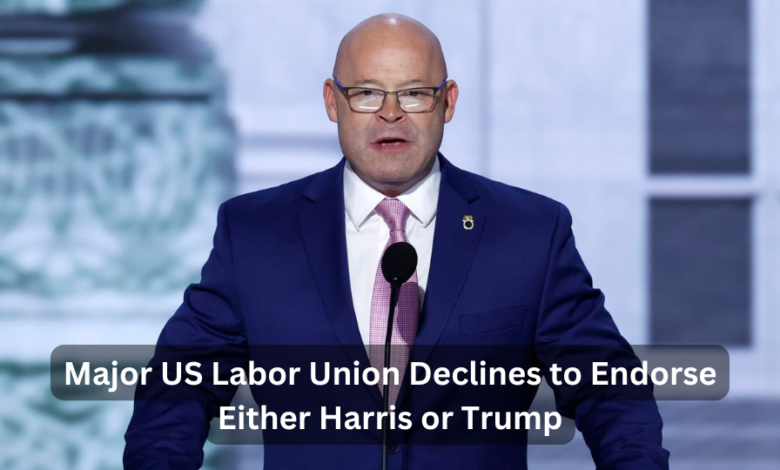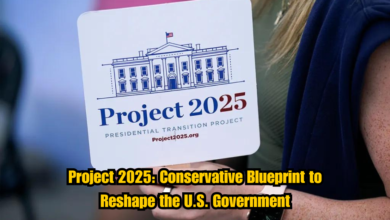Major US Labor Union Declines to Endorse Either Harris or Trump

In an unprecedented move, the International Brotherhood of Teamsters, one of the most influential labor unions in the United States, has opted to withhold its endorsement from both Democratic and Republican candidates in the upcoming 2024 presidential election. This decision marks the first time since 1996 that the union, which represents around 1.3 million workers, has abstained from endorsing a candidate. The lack of backing is seen as a significant blow to the Kamala Harris campaign, especially as it attempts to win over the working-class vote in key battleground states. On the other hand, this development presents a complicated landscape for both Harris and Donald Trump, the Republican nominee.
Historical Significance of the Teamsters’ Endorsement
The Teamsters’ endorsement has historically played a pivotal role in mobilizing working-class voters, particularly in industrial states such as Pennsylvania, Michigan, and Wisconsin. These regions are crucial in determining the outcome of the election, and their working-class demographics often sway the final results.
In past elections, labor union endorsements, particularly from the Teamsters, have helped Democratic candidates secure victories in states with large industrial bases. However, the union’s decision to abstain from endorsing any candidate this time around signals growing discontent and political division within its ranks, something both Harris and Trump are grappling with as the election draws near.
The Teamsters’ Concerns and Membership’s Division
The leadership of the Teamsters, led by General President Sean O’Brien, cited a lack of meaningful commitments from both Harris and Trump on key issues impacting union members. These issues include workers’ rights, pensions, wage protections, and broader labor policies. Despite some engagement with both campaigns, the union remained unsatisfied with the policy positions outlined by either candidate.
Additionally, polling conducted within the union ranks shows a divided membership. According to the union’s surveys, 59.6% of Teamsters members indicated support for Trump, while only 34% favored Harris. Another poll found similar results, with Trump receiving 58% support compared to Harris’ 31%. While these numbers indicate a majority of the rank-and-file membership leaning toward Trump, the union’s leadership opted not to issue a formal endorsement, citing the lack of definitive majority support.
A Blow to Kamala Harris’ Campaign
Kamala Harris, who has heavily courted labor unions throughout her political career, faces a significant challenge following the Teamsters’ decision. As the Democratic nominee, she has positioned herself as a champion of organized labor. Harris has been a visible presence at picket lines and has consistently advocated for workers’ rights, an issue that remains a cornerstone of her campaign platform.
Despite the lack of endorsement from the national Teamsters organization, several regional Teamsters councils, representing more than 500,000 members in states like Michigan, Wisconsin, Nevada, and California, have endorsed Harris. The Harris campaign also continues to tout its support from a large number of other organized labor groups. In a statement following the Teamsters’ announcement, the Harris campaign emphasized its longstanding relationship with organized labor and highlighted the Democratic Party’s commitment to workers’ rights.
Harris’ campaign spokesperson, Lauren Hitt, noted that “Vice-President Harris has literally walked the picket line and stood strong with organized labor for her entire career.” Hitt contrasted Harris’ stance with Trump’s, pointing out that “Trump has suggested that striking workers should be fired,” an issue that has fueled tensions between the former president and some labor groups.
Teamsters’ Leadership’s Political Outreach and Mixed Signals
Sean O’Brien, who took over as Teamsters president in 2022, has made significant strides in reaching out to Republicans, including populist figures such as Senators Josh Hawley and JD Vance. O’Brien has also built connections with Donald Trump, having met privately with him at Trump’s Mar-a-Lago estate in January. Following the meeting, Trump expressed optimism about receiving the union’s endorsement, citing his outreach to working-class voters and efforts to strengthen the economy.
O’Brien, however, sent mixed signals during his appearance at the Republican National Convention (RNC), where he praised Trump as “one tough SOB” but ultimately declined to offer an official endorsement. His decision to speak at the RNC—an unprecedented move for a Teamsters president—alarmed Democrats and sparked internal dissent within the union.
Adding to the controversy, O’Brien criticized Trump and Elon Musk for suggesting that workers who strike should be fired, a statement that further complicated Trump’s relationship with the union. Following his speech at the RNC, O’Brien did not receive an invitation to speak at the Democratic National Convention (DNC), a snub that underlined the growing tension between union leadership and the Democratic Party.
A Union Divided: Local Endorsements for Harris
Despite the national leadership’s decision to remain neutral, several local Teamsters chapters have expressed their support for Kamala Harris. Notably, the Teamsters National Black Caucus and six local union branches have officially endorsed Harris, urging members to back the Democratic candidate. These local endorsements highlight the internal divisions within the union, with many members remaining firmly aligned with traditional Democratic labor values, while others lean toward Trump’s populist rhetoric.
In a recent meeting between Harris and the Teamsters board, Harris reiterated her commitment to labor issues and expressed confidence in winning the election. The meeting, described by some sources as “tense,” underscored the complexity of Harris’ relationship with union leadership. Although Harris has been a consistent advocate for labor rights, some union members feel that her policy positions are not sufficiently distinct from those of her predecessor, Joe Biden.
The Role of Joe Biden and the Labor Vote
Joe Biden, who previously held the title of “the most pro-labor president,” has a well-established track record of supporting unions. His administration’s policies have aimed to strengthen union protections, enhance workers’ rights, and secure funding for union pensions. In September 2023, Biden made history as the first sitting U.S. president to join a picket line when he participated in a strike with the United Auto Workers in Michigan. Biden’s efforts to shore up the Teamsters pension fund to the tune of $36 billion also earned him considerable support within the labor community.
However, despite Biden’s close ties to unions, the Teamsters did not endorse his re-election bid before he withdrew from the race in July. Some reports suggest that union leadership remained hesitant to fully commit to Biden, signaling broader dissatisfaction with the Democratic establishment among some working-class voters.
Implications for the 2024 Election
The Teamsters’ refusal to endorse either Harris or Trump has significant implications for the 2024 election. Without the backing of the powerful union, Harris may struggle to galvanize working-class voters in swing states, where organized labor has historically played a key role in determining electoral outcomes. Conversely, Trump, while enjoying support from a sizable portion of the Teamsters’ membership, faces challenges in securing the union’s official endorsement, particularly given his controversial statements about striking workers.
As the election draws nearer, both campaigns will continue to court the labor vote, recognizing the crucial role it will play in battleground states. Whether the Teamsters’ decision will tilt the balance in favor of either candidate remains to be seen, but the absence of an official endorsement adds another layer of uncertainty to an already unpredictable election cycle.
Conclusion
The Teamsters’ decision to abstain from endorsing a candidate for the 2024 U.S. presidential election reflects the deepening political divide within one of the nation’s largest and most influential labor unions. While the union’s leadership cited a lack of strong commitments from either candidate, internal polling reveals a membership base increasingly split between Trump and Harris. As both campaigns vie for the support of organized labor, the Teamsters’ neutrality may leave a critical gap in voter mobilization efforts, particularly in key swing states that could determine the outcome of the election.



